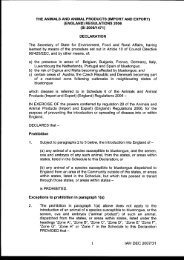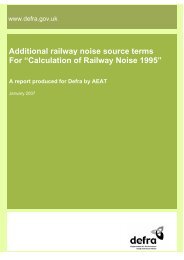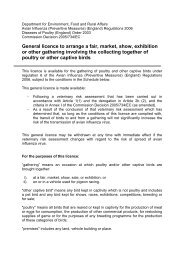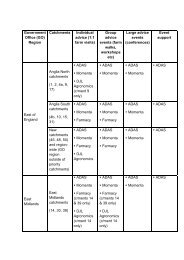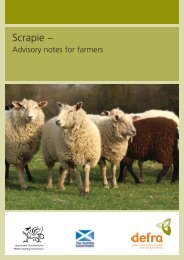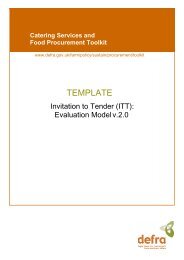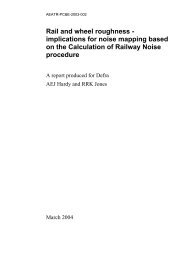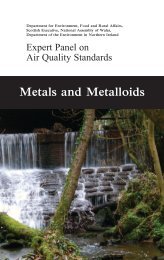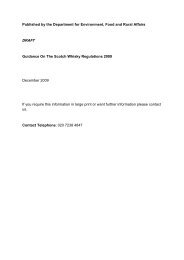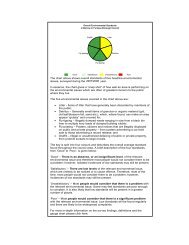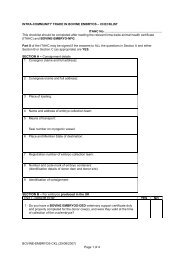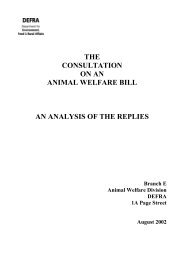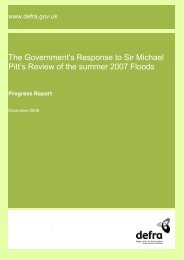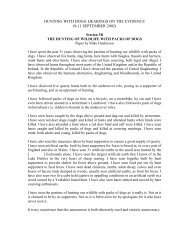Review of the Food-borne Zoonoses Research ... - ARCHIVE: Defra
Review of the Food-borne Zoonoses Research ... - ARCHIVE: Defra
Review of the Food-borne Zoonoses Research ... - ARCHIVE: Defra
You also want an ePaper? Increase the reach of your titles
YUMPU automatically turns print PDFs into web optimized ePapers that Google loves.
Project code: OZ0404<br />
Project title: Bovine neosporosis: <strong>the</strong> evaluation <strong>of</strong> zoonotic risk<br />
and <strong>the</strong> development <strong>of</strong> evidence-based control<br />
strategies<br />
Start date (dd/mm/yy): 01/11/2002<br />
End date (dd/mm/yy): 31/12/2005<br />
£242,267.00<br />
Total cost:<br />
Affiliation: University <strong>of</strong> Liverpool<br />
Abstract <strong>of</strong> research<br />
The newly recognised protozoan parasite Neospora caninum has recently emerged as a<br />
major cause <strong>of</strong> disease in cattle and dogs worldwide (1). In cattle, research by various<br />
international groups, including our own laboratory in a previous DEFRA funded research<br />
project (Contract CSA 3618, 1996 - 1999), has shown <strong>the</strong> importance <strong>of</strong> <strong>the</strong> infection in<br />
<strong>the</strong> etiology <strong>of</strong> abortion and <strong>the</strong> significance <strong>of</strong> vertical transmission in its epidemiology.<br />
This project concentrated on <strong>the</strong> recently discovered oocyst stage <strong>of</strong> N. caninum. It<br />
sought to improve rational control measures in cattle by determining if, and under what<br />
circumstances, oocysts could infect pregnant cattle and cause disease, what risk factors<br />
exist and how likely are oocysts to infect <strong>the</strong> environment. The existence <strong>of</strong><br />
environmental contamination by oocysts also creates a potential zoonotic hazard which<br />
was evaluated in a large scale human serological study.<br />
The project failed to find any evidence <strong>of</strong> exposure to infection in over 3700 human<br />
serum samples rigorously selected and examined by two assays. The results show that<br />
<strong>the</strong> risk <strong>of</strong> human infection in <strong>the</strong> UK is extremely low and that millk and meat from UK<br />
cattle can be regarded as safe in this respect.<br />
In cattle, <strong>the</strong> project showed that oocyst infection in pregnancy can lead to abortion in<br />
cattle if exposure occurs around mid-pregnancy but not if it occurs early or late in<br />
pregnancy. However, exposure at 210 days in pregnancy led to high rates <strong>of</strong> congenital<br />
infection in healthy calves. Thus oocyst infection is likely to be extremely important in<br />
maintaining <strong>the</strong> basic reproductive rate <strong>of</strong> <strong>the</strong> parasite at >1 by creating infected females<br />
which are <strong>the</strong>n presumed to endogenously transplacentally infect all <strong>the</strong>ir <strong>of</strong>fspring.<br />
<strong>Review</strong> Summary<br />
Overall <strong>the</strong> project has generated some important findings, specifically <strong>the</strong> lack <strong>of</strong><br />
evidence for human infection and zoonotic transmission, and <strong>the</strong> lack <strong>of</strong> associated<br />
evidence that dogs were a major source <strong>of</strong> oocyst infection to cattle. Also important was<br />
that although oocysts can infect pregnant cows and cause abortion or congenital<br />
infection, epidemiological risk factors suggested that <strong>the</strong> likelihood <strong>of</strong> this occurring was<br />
low.<br />
The results <strong>of</strong> this research have clearly answered <strong>the</strong> policy question on zoonotic risk<br />
and have shown that, if a zoonotic risk to humans exists in <strong>the</strong> UK, it is very low. The<br />
69



